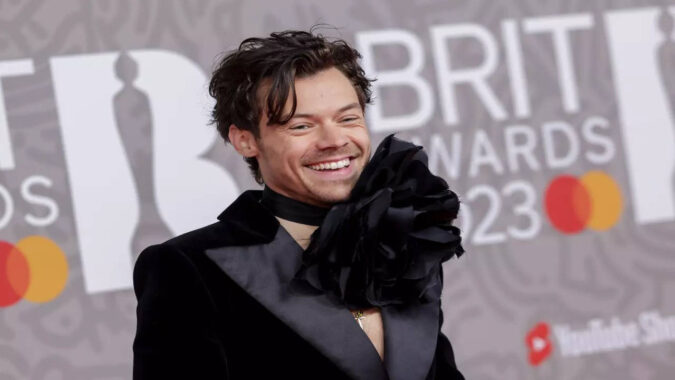On Saturday at a glittering event in London, pop star Harry Styles was named artist of the year at the Brit Awards, the highest honour at Britain’s equivalent of the Grammys.
But to some watching the televised ceremony, the acclaim for the pop icon was a little soured because Styles triumphed in a category that did not have a single female nominee — an unintended consequence of the decision a little over a year earlier by the Brit Awards to merge its categories for best male and best female artist of the year into one gender-neutral top prize.
For the past few weeks, prominent figures in Britain have been discussing the effects of that change on the visibility of female musicians. The experience at the Brits shows the difficulties that can arise from removing gendered categories.
Onstage, Styles made it clear he was conscious of the conversation. “I’m aware of my privilege up here tonight,” he said, “so this award is for Rina, Charli, Florence, Mabel and Becky. ” Those are the names of five female British pop stars — Rina Sawayama, Charli XCX, Florence Welch, Mabel and Becky Hill — who weren’t nominated.
Three years ago, the British Phonographic Industry, or BPI, which organises the awards, faced a dilemma after singer Sam Smith announced they were nonbinary and used they/them pronouns. That made Smith ineligible for the show’s artist of the year awards, which had long been split into “best male” and “best female” categories.
When the BPI announced that it would drop genderedcategories for the 2022 awards, the move was praised by British musicians and newspapers. That decision did not immediately lead to the exclusion of women: Last year, Adele won the first best artist prize. This year, however, the list included four men alongside Styles.
Francine Gorman of Keychange, an organisation that aims to increase female and nonbinary involvement in Europe’s music industry, said the all-male list was “a real step backward” for inclusion. Smith also criticised the list. On Wednesday, concern about the issue made it to UK’s parliament, where the Women and Equalities Committee was holding an inquiry into misogyny in music. Caroline Nokes, the panel’s chair, said afterward that she thought that the Brit Awards had acted “too soon” to remove gendered categories, given the barriers women face to building careers in music.
An all-male shortlist “wasalways going to happen sooner or later” because of the unequal nature of Britain’s music industry, said Vick Bain, a consultant on diversity issues. Women make up only about 20% of artists, and 14% of songwriters, signed to British record labels and publishers, Bain said.
The BPI has not announced any steps to avoid another allmale list at next year’s awards. YolanDa Brown, the BPI’s chair, said this week that the organisation would review the nomination process and determine if any changes were needed to support women. That could include expanding the number of nominees, she said.
But to some watching the televised ceremony, the acclaim for the pop icon was a little soured because Styles triumphed in a category that did not have a single female nominee — an unintended consequence of the decision a little over a year earlier by the Brit Awards to merge its categories for best male and best female artist of the year into one gender-neutral top prize.
For the past few weeks, prominent figures in Britain have been discussing the effects of that change on the visibility of female musicians. The experience at the Brits shows the difficulties that can arise from removing gendered categories.
Onstage, Styles made it clear he was conscious of the conversation. “I’m aware of my privilege up here tonight,” he said, “so this award is for Rina, Charli, Florence, Mabel and Becky. ” Those are the names of five female British pop stars — Rina Sawayama, Charli XCX, Florence Welch, Mabel and Becky Hill — who weren’t nominated.
Three years ago, the British Phonographic Industry, or BPI, which organises the awards, faced a dilemma after singer Sam Smith announced they were nonbinary and used they/them pronouns. That made Smith ineligible for the show’s artist of the year awards, which had long been split into “best male” and “best female” categories.
When the BPI announced that it would drop genderedcategories for the 2022 awards, the move was praised by British musicians and newspapers. That decision did not immediately lead to the exclusion of women: Last year, Adele won the first best artist prize. This year, however, the list included four men alongside Styles.
Francine Gorman of Keychange, an organisation that aims to increase female and nonbinary involvement in Europe’s music industry, said the all-male list was “a real step backward” for inclusion. Smith also criticised the list. On Wednesday, concern about the issue made it to UK’s parliament, where the Women and Equalities Committee was holding an inquiry into misogyny in music. Caroline Nokes, the panel’s chair, said afterward that she thought that the Brit Awards had acted “too soon” to remove gendered categories, given the barriers women face to building careers in music.
An all-male shortlist “wasalways going to happen sooner or later” because of the unequal nature of Britain’s music industry, said Vick Bain, a consultant on diversity issues. Women make up only about 20% of artists, and 14% of songwriters, signed to British record labels and publishers, Bain said.
The BPI has not announced any steps to avoid another allmale list at next year’s awards. YolanDa Brown, the BPI’s chair, said this week that the organisation would review the nomination process and determine if any changes were needed to support women. That could include expanding the number of nominees, she said.
